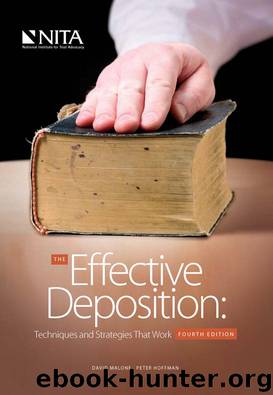The Effective Deposition by Malone David M. & Hoffman Peter T

Author:Malone, David M. & Hoffman, Peter T.
Language: eng
Format: epub
Tags: Law; Depositions
Publisher: LexisNexis / National Institute for Trial Advocacy
Published: 2011-12-31T16:00:00+00:00
CHAPTER TWELVE
PROTECTIVE ORDERS AND APPLICATIONS TO THE COURT
They say that the first inclination an animal has is to protect itself.
—Diogenes Laertius
12.1 Protective Orders
Problems that occur at deposition can sometimes be anticipated, and proactive motion practice can eliminate them. If the deposition has been noticed for an inconvenient time or place; or if privilege issues are likely to arise; or if there may be questioning that exceeds the permissible scope of discovery or a court-ordered limitation; or if opposing counsel’s past behavior in the case suggests improper behavior may occur at this deposition; or if there is concern that trade secrets will be revealed during the course of the questioning, then one of the parties or the witness should seek a protective order in an effort to resolve the problem before the deposition is convened.1 It is often less costly and more convenient to resolve anticipated problems before they arise, either by stipulation or court hearing and order, than to attempt to do so after the problems show up during the course of the deposition.2
Rule 26(c) gives an indication of the wide variety of problems that may be the topic of a protective order. Under this rule, a court may “issue an order to protect a party or person from annoyance, embarrassment, oppression, or undue burden or expense,” including one or more of the following:
(A) forbidding the disclosure or discovery;
(B) specifying the terms, including time and place, for … discovery;
(C) prescribing a discovery method other than the one selected by the party seeking discovery;
(D) forbidding inquiry into certain matters, or limiting the scope of … discovery to certain matters;
(E) designating the persons who may be present while the discovery is conducted;
(F) requiring that a deposition be sealed and opened only on court order;
(G) requiring that a trade secret or other confidential research, development, or commercial information not be revealed or be revealed only in a specified way; and
(H) requiring that the parties simultaneously file specified documents or information in sealed envelopes, to be opened as the court directs.3
A protective order can be sought from either a court in the district in which the action is pending or the district where the deposition is to be taken. Under Rule 26(c), however, a certification must be filed with the motion that there has been a conference or a good-faith attempt to confer with other affected parties in an effort to resolve the dispute without court action. Many of the jurisdictions following the pre-1993 version of the Federal Rules of Civil Procedure also have rules imposing a similar requirement. The risk of bringing a motion for a protective order is that if the motion is unsuccessful, the court may order the moving party or lawyer to pay the opposing party’s reasonable expenses, including attorney’s fees, in opposing the motion. Conversely, if the motion is granted, the opposing party may be required to pay the reasonable expenses, including attorney’s fees, for bringing the motion. The parties should therefore try to resolve the dispute during their conference.
Download
This site does not store any files on its server. We only index and link to content provided by other sites. Please contact the content providers to delete copyright contents if any and email us, we'll remove relevant links or contents immediately.
Objection! by Nancy Grace(1786)
Apeirogon by Colum McCann(1708)
Anatomy of Injustice by Raymond Bonner(1669)
That Every Man Be Armed by Stephen P. Halbrook(1583)
Civil Procedure (Aspen Casebooks) by Stephen C. Yeazell(1557)
The Vaccine Court by Rohde Wayne(1512)
Injustices by Ian Millhiser(1502)
Storytelling for Lawyers by Meyer Philip(1466)
A Practical Guide to International Arbitration in London by Hilary Heilbron(1441)
Restitution by Restitution(1429)
Coercing Virtue by Robert H. Bork(1361)
Broken Scales by Joel Cohen(1353)
Tangled Webs: How False Statements Are Undermining America: From Martha Stewart to Bernie Madoff by James B. Stewart(1340)
The Tools of Argument: How the Best Lawyers Think, Argue, and Win by Joel Trachtman(1318)
A Matter of Interpretation by Antonin Scalia(1316)
INDEFENSIBLE: One Lawyer's Journey Into the Inferno of American Justice by Feige David(1295)
American Tragedy by Lawrence Schiller & James Willwerth(1277)
A Religious Orgy in Tennessee by H.L. Mencken(1256)
Tangled Webs by James B. Stewart(1251)
